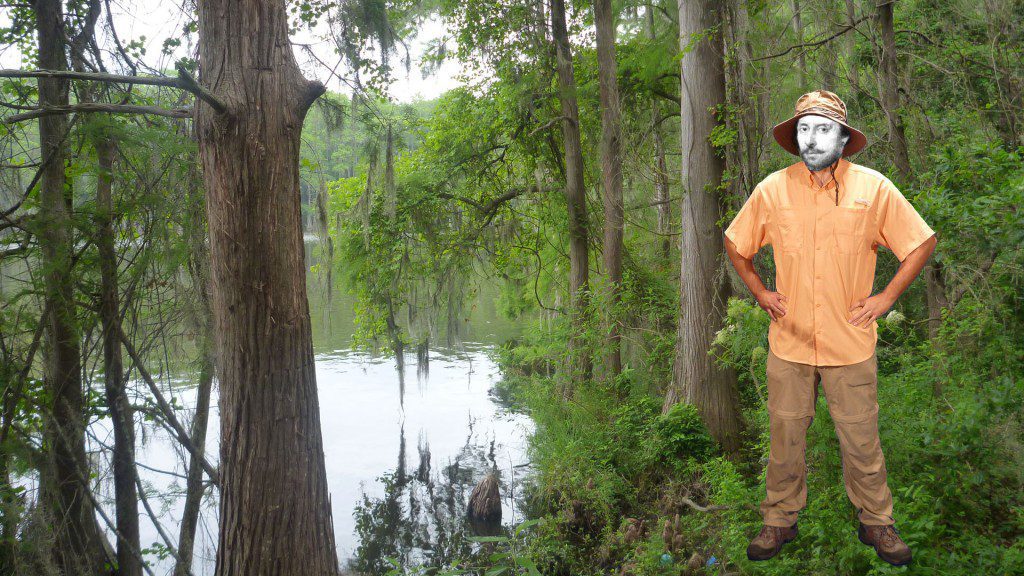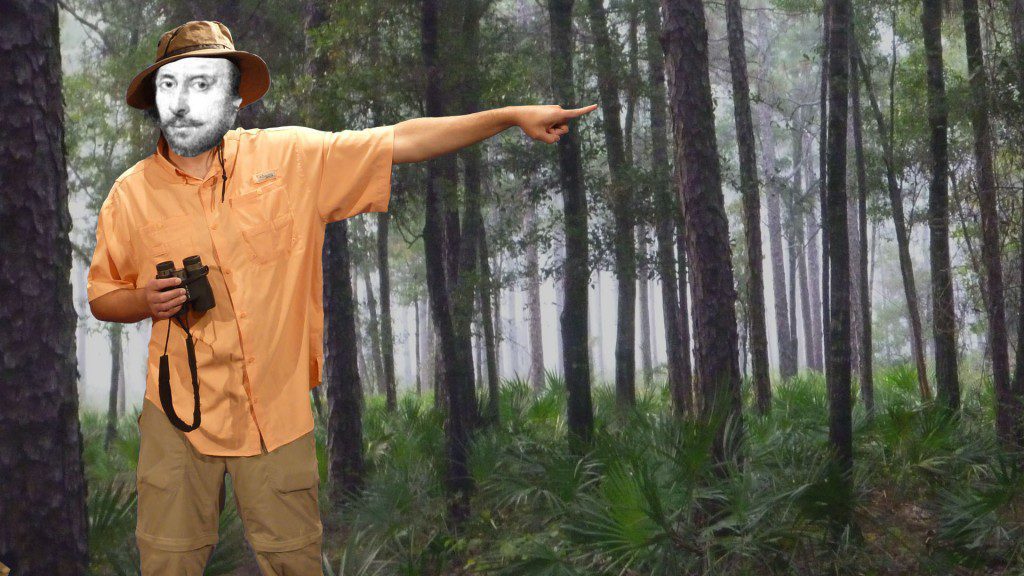Join us for one of three Shakespearian EcoAdventures! Enjoy a short performance with Southern Shakespeare Festival actors and a guided tour through north Florida’s unique ecosystems. It’ll be a day in nature like no other. Spots are limited, so please enter a drawing to come along.
Rob Diaz de Villegas WFSU-TV
Had William Shakespeare ever made it to Florida, what would he have written of it? He was a man who dealt in comedy and tragedy, and he would have found no shortage of either in our fair state. But he was also man who could capture the beauty of nature and the tumultuousness of ecological upheaval. It gets me to thinking. What would a canoe trip down the Wacissa River inspire within him? What tragedy could he compose from the collapse of Apalachicola’s oyster reef ecosystems?
The wonderful thing about well-crafted language is that it can be universal. If we remove his words from the context of their plays, or re-imagine their setting, his words could just as easily evoke Wakulla Springs or the Apalachicola National Forest. And that’s just what we’re looking to do.
In advance of the second season of Shakespeare Uncovered on PBS, we’ll be unleashing Oberon, Titania, and their fairy retinue on the north Florida landscape. We’re partnering with the reborn Southern Shakespeare Festival, who will be staging a Midsummer Night’s Dream this April at Cascades Park. We’ll be taping three segments with them, tying verses from the play to our unique natural settings. And we want you to come along.
Each field trip will feature a short performance, a guided hike, and our area’s reliably stunning visuals. Fill out a quick form to enter a lottery to come along. Winners will be selected and notified Monday, October 27th. Selected participants will be sent video release forms and additional information about each trip.
Fairies sing for the natural order of the Wakulla Springshed
The Wakulla Springs Overland Tour with Jim Stevenson
Saturday November 1
8 am
You spotted snakes with double tongue,
Thorny hedgehogs, be not seen;
Newts and blind-worms, do no wrong,
Come not near our fairy queen.
In Elizabethan England, everyone and everything had its place. There was an order to the universe, with God and queen at the apex, and lower animals like newts and worms at the bottom. Similarly, those smaller critters exist in balance with predators and herbivores, feeding on each other and on plants, in an arrangement that brings order to nature.
But the natural order can be upset.
Join Jim Stevenson, former chief biologist for Florida State Parks, as we follow the path of water from Tallahassee to Wakulla Spring. Urban runoff drains into rivers and lakes, and directly into our aquifer through sinkholes. The water that emerges from the Spring contains an excess of nutrients that feed algae and invasive hydrilla, lower organisms that upset the balance of life along the Wakulla River. They encroach on habitats like those of the apple snail. And they may have forced an animal once emblematic to Wakulla Springs State Park, the limpkin, off of the river.
The Wakulla Springs Overland Tour is presented by Palmetto Expeditions in partnership with the Friends of Wakulla Springs State Park.
Sign up now to enter a drawing for this free EcoAdventure.
Foraging for food in a longleaf forest with Puck and Oberon
Finding food in our natural surroundings
Sunday November 2
8 am
Fetch me that flower; the herb I shew’d thee once:
The juice of it on sleeping eye-lids laid
Will make or man or woman madly dote
Upon the next live creature that it sees.
The pine flatwood communities found throughout our area, when properly burned, shelter within their grasses many succulent plants. These flowers and weedy forbs feed a wealth of forest critters. And they can feed us, too, if we know which ones won’t make us violently ill.
Join wilderness survival instructor Colbert Sturgeon as we forage for tasty treats in the woods north of Tallahassee. In 2013, Sturgeon was featured in an episode of National Geographic’s Journey With Bard (That name is a total coincidence. Too bad it’s already taken).
Sign up now to enter a drawing for this free EcoAdventure.
Shakespeare predicts the clear cutting of the coastal plain forest
A glimpse into “Old Florida’s” forested past
Sunday November 9
8 am at Tall Timber Research Station
The ox hath therefore stretch’d his yoke in vain,
The ploughman lost his sweat, and the green corn
Hath rotted ere his youth attain’d a beard;
The fold stands empty in the drowned field,
During Shakespeare’s lifetime, he saw England’s forests harvested to feed printing presses. A couple of hundred years later, the 90 million acre coastal plain forest of the American southeast helped to build a burgeoning nation. Less than 3% of that original habitat remains, and most of that has been planted in the last 150 years, replacing the original growth forest.
Jim Cox is the Vertebrate Ecology Program Director at Tall Timbers Research Station and Land Conservancy. He will guide us into rare old growth longleaf pine flatwoods in Florida’s Red Hills region. There, we will learn about the species that have been lost or made endangered, and about the amazing productivity and diversity of the longleaf/ wiregrass ecosystem.
Sign up now to enter a drawing for this free EcoAdventure.
These segments will air in January on our Dimensions program. The Southern Shakespeare Festival will also visit WFSQ’s Dan MacDonald to examine the musical selection of April’s production and the evolution of A Midsummer Night’s Dream’s score over the years. Season 2 of Shakespeare Uncovered will air in late January or early February. WFSU’s TV and radio content is funded by a grant from WNET, the PBS member station that produces Shakespeare Uncovered.


